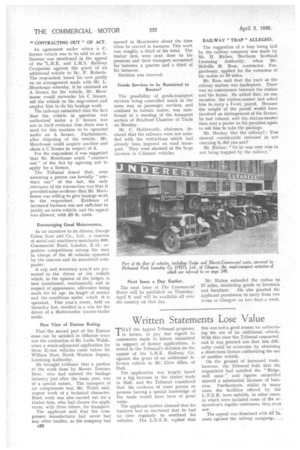" CONTRACTING OUT" OF ACT.
Page 44

If you've noticed an error in this article please click here to report it so we can fix it.
An agreement under whicn C
licence vehicle was to be sold to an Alicensee ' was mentioned in the appeal of the *L.N.E. and L.M.S. Railway Co.npanies against the grant of an additional vehicle to Mr. P. Roberts. The respondent based his case partly on an arrangement made with Mr. L. .Moorhouso whereby, if he obtained an A licence for the vehicle, Mr. Moorhouse would surrender his C licence, sell the vehicle to the respondent and employ him to do his haulage work.
The railways submitted that the fact that the vehicle in question was authorized under a C licence was not in itself evidence that there was a need for this machine to be operated under an A licence. Furthermore, after disposing of the vehicle, Mr. Moorhouse could acquire another and claim a G licence in respect of it.
For the respondent it was suggested that Mr. Moorhouse could " contract out" of the Act by agreeing not to apply for a licence.
The Tribunal .found that, even assuming a person can lawfully "contract out" of the Act, the only relevance of the transaction was that it provided some evidence that Mr. Moorhouse was willing to give haulage work to the respondent. Evidence of increased business was not sufficient to justify an extra vehicle, and the appeal was allowed, 'with £8 4s, costs.
Encouraging Good Maintenance.
As an incentive to its drivers, George Cohen Sons and Co., Ltd., a concern. of metal and • machinery merchants, 600, Commercial Road, London, E.14, organizes competitions among the men in charge of the 40 vehicles operated by the concern and its associated com panies. . .
A cup and monetary awal are presented to the driver of the vehicle which, in the opinion of the judges, is best maintained, mechanically and in respect of appearance, allowance being made for its age, its length of service and the conditions under which it is operated. This year's event, held on Saturday last, resulted in a win for the driver of a Multiwheeler tractor-trailer outfit.
New View of Enston Ruling.
That: the second part of the Enston onus can be satisfied in different ways was the contention of Mr. Leslie Walsh, when a much-adjourned application for three 211-ton vehicles came before Sir William Hart, North Western Deputy Licensing Authority.
He brought evidence that a portion of the work done by Messrs. Downes Bros., who had entered the haulage industry just after the basic year, was of a special nature. The transport of air compressors was, Mr. Walsh said, urgent work of a technical character. Rush work was also carried out for a timber firm, who had chosen the.applicants, with three others, for transport.
The applicant said that the compressor manufacturer had never had any other haulier, as the company had c22 opened in Manchester about the time when he started in business. This work was roughly a third of his total. The timber firm were next door to his premises and their transport accounted for between a quarter and a third of his turnover.
Decision was reserved.
Goods Services to be Restricted to Routes?
The possibility of goods-transport services being controlled much in the same way as passenger services, and confined to certain routes, was mentioned at a meeting of the transport section of Bradford Chamber of Trade on Monday.
Mr. C. Holdsworth, chairman, declared that the railways were not satisfied with the restrictions which had already been imposed on road transport. They were alarmed at the large increase in C-licence vehicles.
Next Issue a Day Earlier.
The next issue of The Commercial Motor will be published on Thursday, April 9, and will be available all over the country on that day. RAILWAY " TRAP " ALLEGED: The suggestion of a trap being laid by the railway company was made by Mr. H. Riches, Northern Scotland Licensing Authority, when Mr. Melville M. Ross, contractor, Forgandenny, applied for the extension of his radius to 50 Miles.
Mr. Ross said that the yard at the railway station was inadequate. There was no conveyance between the station and the farms. He added that, on one occasion, the station-master had asked him to carry a 7-cwt. parcel. Because the weight of the parcel would have involved an infringement of his licence, he had refused, and the station-master then sent a porter to his premises again to ask him to take the package.
Mr. Mackay (for the railway) : You showed considerable restraint in not carrying it, did you not?
Mr. Riches: " Or he was very wise in not being trapped by the railway."
Mr. Riches extended the radius to 25 Miles, restricting goods to livestock and furniture. • He also granted the applicant permission to carry from two farms to Glasgow on two days a week.












































































































